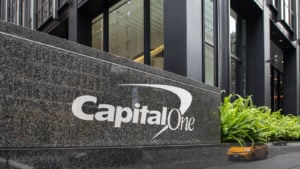
Michael Burry, the legendary investor who famously predicted the 2008 financial crisis, parted ways with three significant stocks – leaving many to ask: Should we follow his lead? Perhaps. First on the list of Michael Burry stocks is a Chinese e-commerce giant that once seemed invincible. Unfortunately, it now faces many challenges which could greatly impact its revenue.
Another one of the top Michael Burry stocks being sold is deeply entrenched in the volatile world of oil and gas. It finds itself at the mercy of fluctuating prices and a global push towards cleaner energy alternatives. Finally, the third is battling rising delinquency and charge-off rates. All of which we’ll discuss in greater detail.
Michael Burry Stocks: Alibaba (BABA)

The Chinese government’s increased regulatory scrutiny and potential antitrust measures could significantly limit Alibaba’s (NYSE:BABA) market dominance. Further, the ongoing uncertainties related to the post-COVID economic recovery could impact consumer spending and overall business growth.
Also, while Alibaba Cloud has shown growth in revenue and potential in AI services, intensifying competition from other global cloud service providers could limit its market share expansion and put pressure on margins. The departure of Alibaba’s long-standing CEO, Daniel Zhang, could lead to transitional challenges and potential disruptions, as well. No wonder this is one of the top Michael Burry stocks to exit.
Devon Energy (DVN)

Devon Energy (NYSE:DVN) is greatly exposed to the volatility of oil and gas prices, which can significantly impact its revenues and profitability. Further, the global shift towards renewable energy sources could have long-term implications for oil and gas companies like Devon Energy. As governments and markets prioritize cleaner energy alternatives, demand for fossil fuels could decline over time.
Globally, investor sentiment towards the oil and gas sector is changing rapidly. It is influenced by factors such as ESG (environmental, social, and governance) considerations and shifting investment preferences. If investors increasingly favor companies with strong ESG profiles or divest from fossil fuel industries, it could impact Devon’s stock performance and access to capital.
Rapid technological advancements, such as breakthroughs in extraction techniques or energy storage solutions, could reshape the energy landscape. If new technologies make unconventional oil and gas extraction less competitive or accelerate the adoption of renewables, Devon Energy’s asset portfolio and business model could become less valuable.
Capital One (COF)

Capital One (NYSE:COF) has seen a significant increase in delinquency and charge-off rates. If these trends persist, it could lead to higher provisions for loan losses, impacting the bank’s profitability and capital.
The consumer banking segment is also experiencing declining auto originations, leading to decreased ending loans. Lower auto originations suggest weakening consumer demand or tighter lending standards, which could hinder the segment’s growth prospects. Additionally, increased auto charge-off and delinquency rates could signal financial stress among consumers, potentially leading to higher credit losses.
Furthermore, the commercial banking segment has witnessed a decline in ending loan balances and deposits, driven by tightened credit standards and loan movements. The transition of loans to being held for sale and the decrease in deposits indicate businesses’ decreased demand for credit and potential economic uncertainty. Moreover, the increase in the annualized charge-off rate in the commercial banking segment points to heightened credit risk among commercial clients.
Additionally, Capital One acknowledges the need to monitor competitors’ actions and potential marketplace risks. Therefore, shifts in the competitive environment could impact its growth strategy.
Looking forward, Capital One’s allowance for loan losses has increased in certain segments due to changes in the economic outlook and loan growth. This suggests that the bank is anticipating potential credit losses in the future. The fact that the economic outlook assumes worsening conditions, albeit less severe than previously projected, indicates potential concerns about economic stability and credit quality.
As of this writing, Yiannis Zourmpanos was long BABA. The opinions expressed in this article are those of the writer, subject to the InvestorPlace.com Publishing Guidelines.





